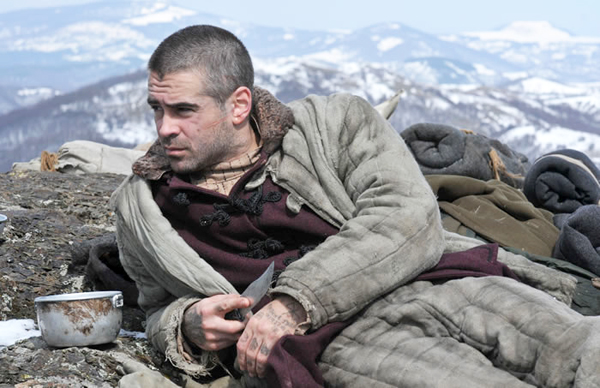|
Reviews of Recent Independent, Foreign, & Documentary Films in Theaters and DVD/Home Video

THE WAY BACK Director Peter Weir excruciatingly punishes an impressive international ensemble in The Way Back. Like millions who disappeared under Stalin’s boots, Polish cavalry officer Janusz (played all-out by the British actor Jim Sturgess) is imprisoned and tortured after the 1939 Soviet invasion of Poland. Under torture, his wife admits that he’s fluent in German and English, implicating him as a spy. His decades-long sentence begins when he’s impressed into a line of convicts marching through Siberia to a gulag. The long reach of Stalin’s brutal arm through Eastern Europe is shown in the diversity of these “enemies of the people,” including a Latvian priest (Gustaf Skarsgard, of the Swedish acting clan) and a jocular Serbian (Romanian Dragos Bucur), who displays humor to distract his fellow inmates from their travails. Janusz commiserates with two fellow Poles, one of whom puts his artistic talents to valuable pornographic use in prison. And among the inmates, a Russian actor (the chameleon Brit Mark Strong) acts out escape plans in his head, an easier alternative than facing the reality. (He was arrested for a favorable stage portrayal of an old regime aristocrat.) However, his ideas inspire Janusz and the others to break free. The cryptically named Mr. Smith (Ed Harris) brings to sympathetic life a tragically forgotten footnote to history, the Americans who were encouraged to emigrate to the optimistic future of the Russian Revolution’s workers’ paradise, only to find themselves later denounced as foreign spies by the paranoid Stalin. Not all the prisoners here were arrested for political reasons—the guards let the violent career criminals run the joint, like a tattooed Russian gambler (the Irish Colin Farrell), who flees with the escapees. Their escape from the snowbound Siberian camp is planned and carried out comparatively smoothly, compared to other POW movies, but that’s just the start of a year-long walk to find freedom over 6,000 miles through what seems like every possible climate. Heading blindly towards Lake Baikal, the arduousness of their path becomes more than a physical endurance when they encounter a teenage girl, Irena (the Irish Saoirse Ronan). Her changing accounts of how she ended up on the run raise trust issues about whether they should share their severely limited food and water. She also brings out different feelings in each man—empathy for a sister urchin in the criminal, parental protection in the stoic older American. She wheedles personal background that they had not revealed among themselves. It’s completely unpredictable to anticipate who will make it through each challenge and who won’t. Chance is as much a factor as endurance or Boy Scout resourcefulness. What comes across beautifully in their incredible adventure is how each of their skills and personalities makes the journey possible. Ironically, their cooperation looks like an idealistic Marxist commune. Russell Boyd, Weir’s frequent cinematographer collaborator, magnificently brings human perspective to a very large continent. Footage from National Geographic films (a co-producer) is seamlessly incorporated, as well as snowy Bulgaria standing in for the forests of Siberia, the dunes of Morocco for Mongolia’s Gobi Desert, and the actual landscape of India. The end of their astonishing trek, through the Himalayas of a Tibet before the Chinese invasion, recalls a bit too much Lost Horizon’s (1937) vision of the fictional Shangri-la, with the helpful and generous locals kindly pointing the way on the men’s presumed religious pilgrimage to Lhasa.
Unfortunately, Weir tacks on a heavy-handed montage of the Evil Empire
until the fall of the Berlin Wall, leading into an unduly
sentimentalized reunion that only serves to emphasize that the film’s a
loose composite from a novel and other testimonies of gulag escapees.
The brutalities of Stalin’s regime are being seen more now in
film—Andrzej Wajda’s
Katyn
and Kevin McNeer’s new documentary
Stalin Thought of You about the cartoonist Boris Efimov.
Stalinists could start replacing Nazis as historical villains in the
movies, but the long suffering of the very large number of victims and
the exemplary fortitude of the survivors is impressively moving without
any political embroidery.
Nora Lee Mandel
|

